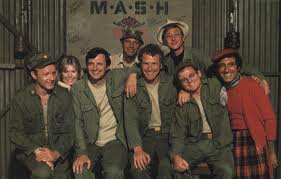Stereotyping is Funny
Posted: May 11, 2011 Filed under: Left vs Right, Satire, Stereotypes on TV project, TV | Tags: 30 Rock, Americans, Conservative, Liberal, MASH, politics, satire, stereotypes, Tea Party Leave a comment Following the success of the film M*A*S*H (1970), the war parody depicting life during the Korean War for a group of drafted doctors, was adapted for TV. When the show ended in 1983 after it’s eleven-year run, it was the most watched season finale of all time. M*A*S*H not only satirized the military and the American government, but various American personalities. Best example: Major Frank Burns. A wealthy, patriotic gun lover, the conservative doctor constantly bragged about having his own practice “back in the States,” quoted from the Bible, and quipped about his strict wife while having an affair with another major.
Following the success of the film M*A*S*H (1970), the war parody depicting life during the Korean War for a group of drafted doctors, was adapted for TV. When the show ended in 1983 after it’s eleven-year run, it was the most watched season finale of all time. M*A*S*H not only satirized the military and the American government, but various American personalities. Best example: Major Frank Burns. A wealthy, patriotic gun lover, the conservative doctor constantly bragged about having his own practice “back in the States,” quoted from the Bible, and quipped about his strict wife while having an affair with another major.
In the second season episode titled “The Chosen People,” the following exchange takes place in the operating room:
HAWKEYE: Frank, by a strange coincidence, the inhabitants of Korea communicate in Korean. It wouldn’t hurt us to speak their language.
FRANK: I speak American. And I can go any place in the world.
TRAPPER: We can have you packed in 20 minutes.
HAWKEYE: We’re living in Korea, Frank.
FRANK: Not me, fella! I’m part of the American military establishment. I eat in an American mess, I shop in an American Px. All I want to do is save these people and go home.
DR PAC: And we thank you from the bottom of our bomb craters.
Twenty three years after the last M*A*S*H aired, from the minds behind Saturday Night Live blossomed 30 Rock. Quirkier than M*A*S*H was ever allowed to be, 30 Rock not only pokes fun at the American conservative, but the American liberal as well. Like Frank Burns, the portrayal of characters on 30 Rock skirt the line between reality and fiction. Yes, some wealthy conservatives said President Obama could actually be from Kenya, but none have an invisible AMEX card or “whip pennies at the drum circle” in Central Park.
But what do these political portrayals accomplish?

The depiction of the extremes for comedic reasons makes the stereotypes all the more apparent to the viewer. In one of the most brilliant episodes of 30 Rock, “Brooklyn Without Limits,” we see Liz Lemon obsessing over how socially conscious her new jeans company is, only to discover it’s owned by Halliburton, while Jack tries to aid a conservative Tea-Party-esque politician, he realizes that someone who wants to put casino’s on the moon should not actually be elected to Congress.
Plus, we learn that Che Guevara’s great grandfather was Domingo Halliburton and liberals should really find someone else to wear ironically on t-shirts.